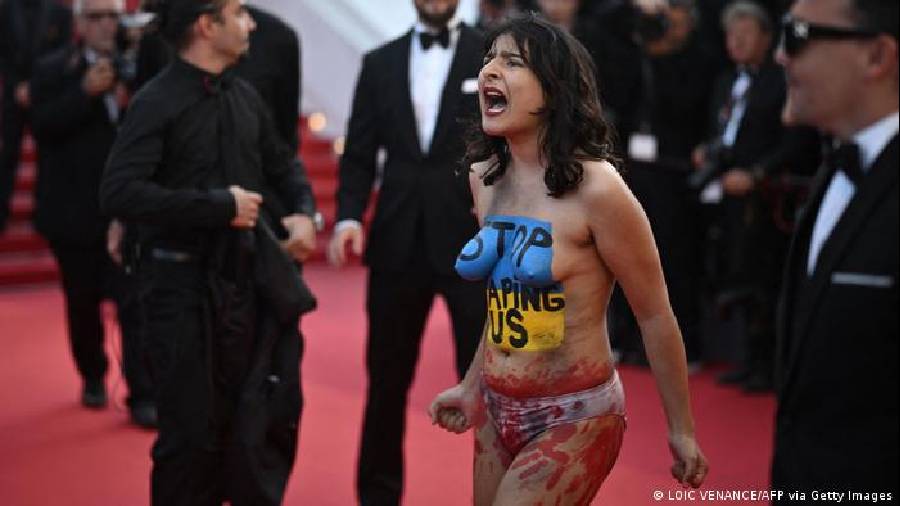This year's Cannes has been a tale of two festivals. The 75th Festival de Cannes has delivered on its promise to "bring back cinema" after the ravages of COVID with a joyous, maskless celebration of movies and the people who make them.
The red carpets have been full, the parties raucous and the films — from Tom Cruise's blockbuster "Top Gun: Maverick" to Cristian Mungiu's small-town Romanian drama "R.M.N." — have shown the full range of what cinema can do.
Protests on the red carpet
But the uglier realities of the world, including the brutal war in Ukraine, have continued to intrude on the celebrations.
At the world premiere of George Miller's "Three Thousand Years of Longing," a 1,001-Night-style adult fairy tale starring Tilda Swinton and Idris Elba, a woman stripped nearly naked on the red carpet to reveal the colors of the Ukrainian flag, with the words "Stop Raping Us" painted on her chest.
Two days later, at the premiere of Ali Abbasi's "Holy Spider," a story of a prostitute-murdering serial killer in Iran, a dozen women stopped on the red carpet steps, held up canisters of black smoke and unfurled a long banner listing the names of the 129 known women who were brutally murdered in France since the last Cannes Film Festival in July last year.
Fighter jets for the 'Top Gun' premiere
At the "Top Gun: Maverick" premiere, a squadron of French fighter jets roared over the red carpet, a thunderous advertisement for the Hollywood action movie that, like the 1986 original, is slick, entertaining propaganda for the American military industrial complex.
But for many on the ground, it was terrifying. Some diners, among them filmmakers from Ukraine, ducked in terror under their tables, convinced they were about to be bombed.
A clash of glitz, Zelensky and zombies
The Cannes Festival has tried to straddle the divide, providing cinema's biggest party while still acknowledging the misery away from the Croisette.
During the opening night ceremonies, Ukrainian President Volodymyr Zelensky appeared via a live video call from Kyiv, telling the room of filmmakers and journalists "it is necessary for cinema not to be silent" and that Ukraine "will win this war."
Once the ceremony was concluded, the festival kicked off with the premiere of "Final Cut," a French-language zombie comedy. It was borderline schizophrenic.
Another such moment came at the premiere of "Triangle of Sadness." In Ruben Östlund's crude (but very funny) capitalism satire, a yacht full of the super-rich goes down at sea, stranding its passengers on a desert island. The ship's maid, the only one who knows how to fish and make fire, suddenly finds herself at the top of the social pecking order. It's a favorite for the Cannes' best film prize, the Palme d'Or.
But watching the movie amid a privileged crowd of gowned and tuxedoed elites was an exercise in social dissonance.
As was speaking to Ukrainian filmmakers in Cannes, many of whom had been on the frontlines of the war before taking time out to fly to France and discuss their movies, and, inevitably, the state of their country.
Sitting in the noon sun, on a balcony overlooking the Cannes harbor, director Maksym Nakonechnyi calmly discussed his drama "Butterfly Vision," playing in Cannes' Un Certain Regard section, which looks at female Ukraine soldiers who struggle with PTSD after their return from the front.
He acknowledged the strangeness of being at the world's most glamorous film festival while, miles away, his homeland is struggling for its very survival. But he said all of Cannes' glitz could serve a greater purpose, if it focuses attention on Ukrainian stories.
"It's important for us to be here, for Ukrainian films and Ukrainian stories to be seen and heard," he said. "Before this war, the Ukrainian perspective was marginalized or ignored, there was this false perception of us as just a part of a bigger, post-Soviet cultural field. Of course, that was the result of Russian propaganda. That's over now. There is no way back. The process has started where the world has begun to see us as a sovereign identity with all the aspects that entails: cultural, political, sociological, existential and metaphysical. A Ukraine with a separate post-colonial identity."












